Austin Film Festival 2019: THE KILLING OF KENNETH CHAMBERLAIN (& Interviews)
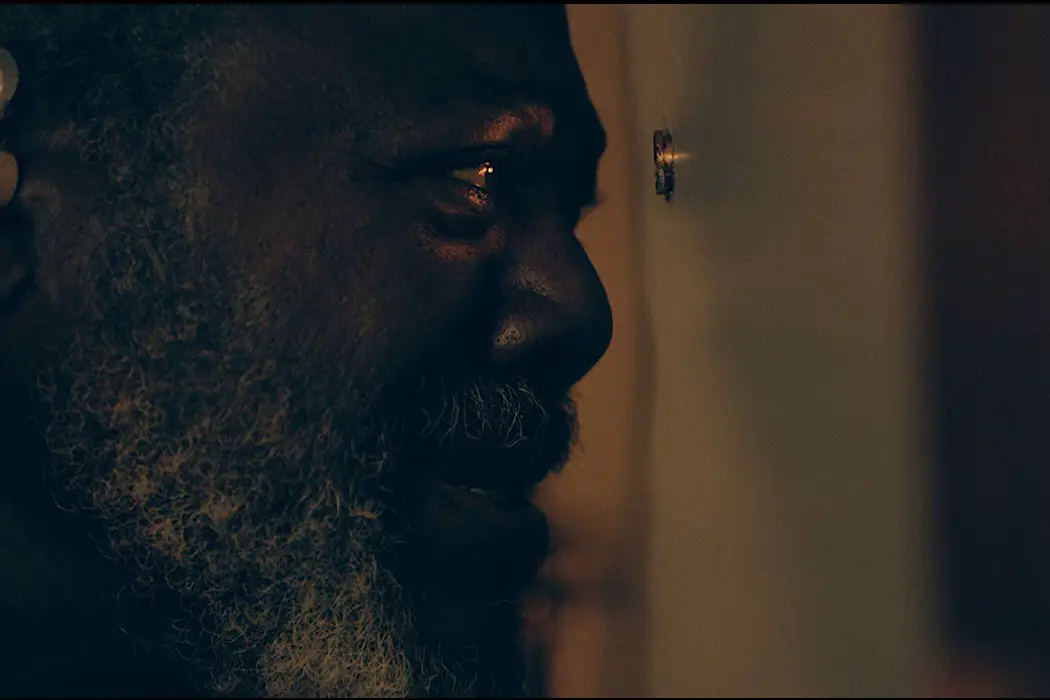
Kristy Strouse is the Owner/Editor in Chief of Film Inquiry,…
Based on the true story of the murder of Kenneth Chamberlain in White Plains NY in 2009, this feature (which won best narrative feature award at Austin Film Festival) is the kind of film that’s hard to watch, but necessary.
As you see Kenneth (played with unyielding heart by Frankie Faison) remove his life alert device as he’s sleeping, prompting a notification to make sure he’s okay, there’s a real sense of frustration. Much like the officers who handle this situation poorly, this is a piece of equipment meant for protection, not injury. When he doesn’t answer the phone the police are dispatched to his door and from there it’s a spiraling of events that are both maddening and gut-wrenching.
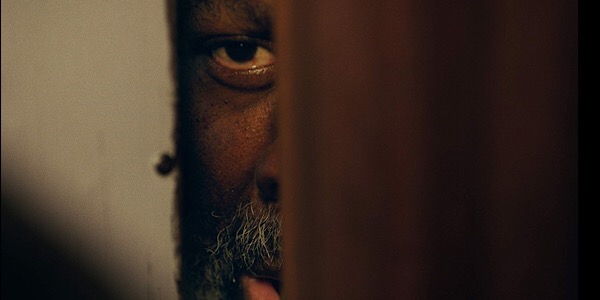
It is declared early on that he suffers from a heart condition and is bipolar. His anxiety and paranoia come through as his confusion elevates when the police insist on coming in. At first, it’s concern, but as he says (and it’s stated after he says it over 60 times on the recording) he’s alright and can be left alone, but eventually some of the officers believe he may be a threat.
For anyone, this would be a stressful and elevating situation. For someone who is medically or psychologically afflicted, even more so. As things increase, and you know what’s coming, there’s an uneasy gestation in your chest. Director David Midell handles the telling of Kenneth’s tale with care, but also urgency, putting us there with him.
As more police arrive, some of the ones there continue to grow in agitation, further invoking a response from Kenneth where he feels he needs to protect himself. Even the woman on lifeline, who is in contact and where a lot of the audio recordings come from, advises them to leave, but they ignore the request.
The use of a slightly shaky cam at times brings an even more evident sense of realism. This hour and fourteen-minute film is all intense emotion. There’s no letting up, as the events unfold nearly in real time. There are mainly two places of shooting in this movie, the inside of the apartment and the hallway/staircase outside. There’s just a door between them, and in a lot of ways on one side is the truth and the other lies, just as one is right and one is wrong, and all that’s holding these two clawing sides at bay is a door. Which, by the end seems pretty frail. Kenneth fights until the final moments, despite them demanding him to stop (and the resistance to injustice no matter your frame of mind, should never be an option), up until the moment a police officer murders him.
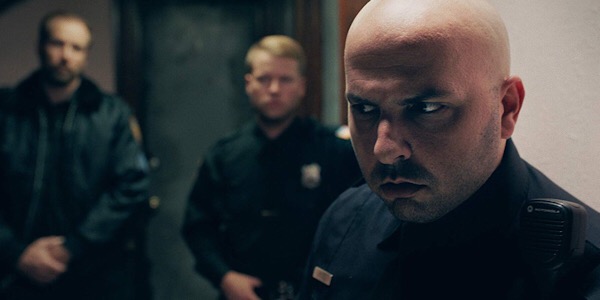
Yes, it’s murder, and at this time, no one has been indicted and no charges brought. After the credits we see his son talk, along with audio clips and images. Many of the officers had previous complaints against them, and the mishandling of this situation is a story that is far too common. This isn’t an isolated event and the injustice here makes for a significantly powerful film. The Killing of Kenneth Chamberlain is brimming with stellar performances, and it’s a film that will remain with you long after you finish.
Scott Markus from The International Screenwriters’ Association and I were able to sit down with Kenneth Chamberlain Jr, writer/director David Midell and actor/producer Enrico Natale about bringing such a devastating story to screen.
What kind of adjustments and transformations did the script go through, from the beginning to the end?
David Midell: The toughest thing I think was figuring out where we were going to… because the real event lasted I think between 90 minutes to two hours. The script and the film is so, so intense, and it basically plays out in real time, and we wanted it to be very lean and quick. So, I think the most challenging thing was where were we going to compress things a little bit where were we going to maybe composite a few characters or fictionalize a character here and there and and I think it’s I think it is important to say that the, you know, while the script is as kind of mentioned based on the transcripts, based on the audio and visual documentary evidence that exists, the police officer characters are fictionalized. Their names and likenesses that have been changed.
Certain ones have been composited, certain actions and lines of dialogue have been switched around, those kinds of things. So, that was done both for legal reasons and artistic reasons. But I think that was the most challenging thing, you know, figuring out where we were going to massage things a little bit to make it more salient for the audience without, obviously compromising the essential truth of the story that we were telling. Obviously, this is a fictional narrative film that’s based on real events, but as with any narrative film, there are these small moments like I said that are massaged, that are tweaked, that are compressed. And I think that was really the most challenging part of developing the script and then there wasn’t a whole lot, there wasn’t a whole lot that changed from the initial drafts of the script to what appeared on screen. Again, sort of because we wanted to stay pretty true and honest to the transcripts and to what actually happened, so we really didn’t make any real significant adjustments from script to screen.
Enrico Natale: I think one of my, you know, in the script, before we in pre -production I think one of the biggest things I enjoyed doing was finding the humanity in some of these officers and really talking with David about like, you know, where do we go with these guys? Even giving Rossi [his character] a little bit more of a three-dimensional kind of arc, because I am kind of the “what if” police officer. What if what if they would have done things a little bit differently? And finding a little bit more of that transformation for his character. Even with Sergeant Parks, he was a big one. You know, that was one that we talked about frequently. He’s teetering on that edge of like…is he good? Is he bad? Trying to find even subtle, simple ways that we can kind of color his character just a little bit more…I think as people who were writing, I think that was a very enjoyable process for me to see too. As you’re going on and then as you get people cast, knowing how they are and knowing who they are, and then kind of adding the subtleties that we know they can do into that role to really heighten them, that was all very interesting to me.
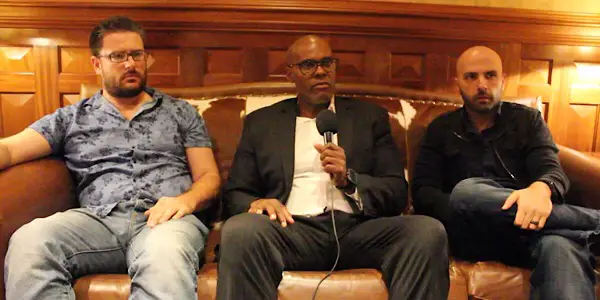
Enrico, as a producer as well, can you talk a bit about the legal side of things? How those conversations went?
Enrico Natale: It was very hush-hush. We didn’t want any sort of attention. I got mad at someone because they like tried to put up a very small little news article in a very tiny little town…they posted something and I did not want it. And that was something that was very hard for Kenneth because he, you know, he wanted to spread it to the world and, and I think the big thing was like: No, not yet. Wait till the world premiere, wait till we’re out, so that the movie and the creation of the film had no distractions. Nothing that that could kind of interfere with the process of making a movie- which is extensive especially for independent film. You know, we don’t have giant studio backings that can just throw lawyers at something, if something were to come our way, we don’t have that.
So, we had to focus on the film, we had to focus on finishing this film before you know we had any sort of attention on this movie. Which I think we accomplished. I know that was so hard for him [points to Kenneth] but, I mean, you did it, and I think it was absolutely worth it.
David Midell: Yeah, I want to say that Kenneth and the Chamberlain family’s support throughout the process has been so incredibly important and appreciated. And, you know that the project never would have happened without, without his support and their support and just their belief and trust in us. I want to acknowledge that, because, you know, this is obviously very personal for them and they did not have to trust us to tell this story. They didn’t have to be so generous and gracious and accommodating. And, you know, understanding of our process and all our learning about the family, learning about what happened. You know, getting through the film and the many, many stages of the filmmaking process. And it’s a very difficult thing and many people, many families would not have been as patient and gracious and understanding and supportive as Kenneth and Chamberlain family have been.
But Kenneth also did tell us that, you know… we had this conversation, a month or six weeks ago…that when word comes out about the film, the White Plains police department is going to hear about this, they’re going to know about the film, they are not going to like it and you, as the producers are probably going to get calls from Westchester County media from White Plains media. So, you know, be prepared for that. And, he said it and it happened. I think the day we announced that the film was going to have a release, Kenneth started getting calls asking for our information. So, he was absolutely right and and that’s one of the reasons that we have all wanted to make sure that we’re on the same page that we’re prepared for when that’s going.
For anyone watching this, wanting to cover a real story, what advice would you give?
Kenneth Chamberlain Jr: From the family’s perspective? I think transparency on your part is very important to the family because most families are dealing with situations like mine. We have been failed, 100 times over. So, when someone comes up to you and they say, Hey, I heard about the situation, I want to help you. You’re kind of looking at him with a side eye saying, “Well, how do you want to help?” Because you know these hidden agendas. So, I would just simply say that to anybody that’s thinking about covering something in dealing with a family with some type of personal issue: Be honest, and be upfront about everything. Let them know exactly what it is that you’re trying to do, and just really have 100% transparency on both sides.
I know this has been difficult for you [Looking at Kenneth Chamberlain Jr] what’s it been like seeing this made and the response you’ve gotten?
Kenneth Chamberlain Jr: I’ve seen the film, the rough takes, you know every step of the way they made sure that I saw everything. And like Enrico said “I don’t care how many times you see it, your reaction is still the same. Tears start to fall, you’re quiet. It’s almost like you’re experiencing that trauma.” You know, It’s November 19 2011 all over again. And again, it goes back to how we were treated by the system and how we felt the system failed us.
So, as Enrico said when they started doing this, I wanted to tell the world, but I had to stay quiet, because I also understood that this system and this city of White Plains was powerful enough that if they could have shut down production somehow they would have tried. And so, once we put the poster out there and then the people saw the trailer…I mean the city of White Plains is going crazy right now. They want to know when is the film coming to White Plains when can they see it, and of course the elected officials and the police department and the DA’s, They don’t like it. Because one of the things that I’ve hashtag underneath it is: the world will know. Now, the world will know because they put out one narrative that wasn’t true, and now you’re going to see what actually happened.
So, it’s a difficult process. We’re still in a legal process where any appeal process so it’s very hard but, you know, as I said to them, we will look at it this evening and the tears will fall but I’ll gain my composure and I’ll address the audience and I’ll answer any questions that they have because that is the only way that the story is going to be told, that is the only way that there will ever be any type of accountability. I don’t know if we’ll ever truly have justice, hopefully some semblance of it, but at least now, as I said to them, people will never forget about Kenneth Chamberlain senior now because this movie will be here, even when I’m not.
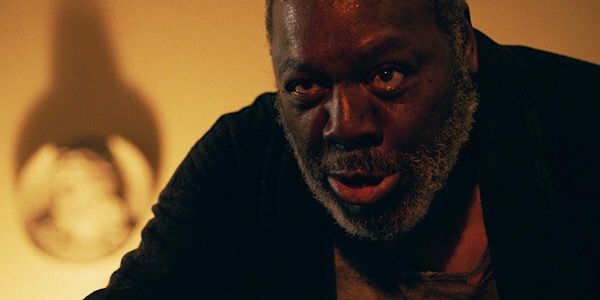
What do you want the average person walking out to think and feel?
Kenneth Chamberlain Jr: I want people to understand that Kenneth Chamberlain could be any one of us, especially when you have a system in place that really doesn’t place value on life. Kenneth Chamberlain could be me, could be you. All it takes is the wrong, law enforcement officers in that situation. And then, in a 10th of a second, it could go terribly wrong. So, I want people to say, what can we do to try to fix this? What mechanisms can we put in place so no other family member has to experience this? And that’s really what I want to happen. I want to the dialogue to begin to happen. But, along with that dialogue, it has to be action. And that will really come from our leadership elected community and faith based, as long as they are on the front lines pushing the issue. That is the only way we will affect positive change. And hopefully the movie will do that.
David Midell: To piggyback on what Kenneth said, I completely agree with everything he said. I think that, the film, you know, we, the film doesn’t necessarily provide answers, but we want there to be questions. Questions about whether law enforcement officers receive adequate training, on how to de-escalate someone in a crisis, whether it’s a person with a mental health challenge, a disability, or someone without a mental health challenge or disability. Are police departments recruiting the right types of people for these jobs? Are there adequate mechanisms in place that allow for accountability for police officers when misconduct occurs? Does everyone really receive equal treatment under the law? I think the answer to that question is pretty obvious. What factors affect the type of justice that someone receives under the law? Does their zip code affect it? Does the color of their skin affect that? Does their mental health status affect it? Their disability status? You know, all of those questions, I think, are really important questions that need to be asked.
What was it like winning the award for best narrative feature?
David Midell: It was amazing. I was not expecting it. You know, I obviously knew that we have a really amazing film, but, you know, when you look at some of the other films that were nominated, I was assuming that many of the other films had higher budgets than ours, had more star power than ours, and were made by people who might have been better connected in the business.
So, I was really, really honored that we won the award and I think it speaks to how important this issue is, how important the national conversation that’s going on right now is, and how much passion was put into this film by everyone who was involved. I don’t think that the film belongs to me. I don’t feel like the film necessarily belongs to any one person because so many people have put so much blood, sweat and tears into the film at this point. And I think that’s really what made it special and that’s what made winning the award so special.
Can you also talk about how the film festival world helps films like this?
Enrico Natale: Sure, I mean I’ll tackle both of these in my answer, just because you know, we were ecstatic. The winning Best narrative feature at Austin Film Festival is such an incredible honor. This is a writers Fest, and they focus on story and I think there’s no better story for us to be able to push to the forefront and to have that honor. I think the reason, you know, as filmmakers we’re always like oh my god like we want our films to be, you know, we want all the accolades…but this is so much more than that, it’s just so much more than that. And I think we all feel that, and I’m just so happy that they recognize that that this story deserves to be seen and us getting this award allows us the ability to kind of open up people’s eyes a little bit more on this subject and, hopefully, you know, give us that opportunity to be seen.
With film festivals, that’s exactly what it does, right? It allows your film the ability to be seen, it allows your film to be seen by other filmmakers, by distributors, writers and the producers, actors, I mean everyone. I mean you can see it and it’s a celebration of film, and I think that that’s just beautiful. It’s beautiful for our industry. And I think Austin has done an incredible job with this one and I think it was a success, certainly for us but I think for everyone too.
We want to thank Kenneth Chamberlain Jr, David Midell and Enrico Natale for chatting with us.
Does content like this matter to you?
Become a Member and support film journalism. Unlock access to all of Film Inquiry`s great articles. Join a community of like-minded readers who are passionate about cinema - get access to our private members Network, give back to independent filmmakers, and more.
Kristy Strouse is the Owner/Editor in Chief of Film Inquiry, writer, podcaster, and all around film and TV fanatic. She's also VP of Genomic Operations at Katch Data and is a member of The Online Association of Female Film Critics and The Hollywood Creative Alliance. She also has a horror website: Wonderfully Weird & Horrifying.













